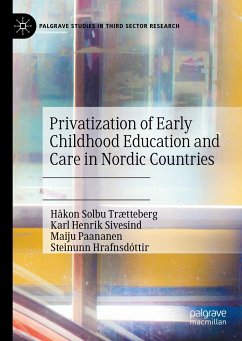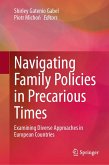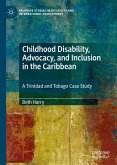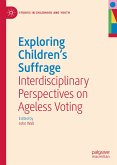"This book is unique in analyzing the development of Early Childhood Education and Care (ECEC) in Nordic European societies from a welfare mix perspective. Albeit subject to "This book is unique in analyzing the development of Early Childhood Education and Care (ECEC) in Nordic European societies from a welfare mix perspective. Albeit subject to national variation, the Nordic model of ECEC has transited from publicness, childcenteredness, and transparency towards greater reliance on for-profit provision, service diversification, and performativity. The book is brilliant and convincing in identifying both the drivers and pathways of this profound institutional change."
-Antoni Verger, Professor of Sociology, Autonomous University of Barcelona, Spain
"This is a much-needed and timely book on ECEC governance in the Nordic welfare states. The readers are provided with detailed comparative accounts of diverging and converging Nordic trends. In addition, the book fruitfully addresses a wider and crucial contemporary issue in the Nordic welfare states-the(contested) role of private providers. These features make this book a very important contribution."
-Linda Rönnberg, Professor in Educational Work, Umeå Unversity, Sweden
This book explores the increasing role of private providers in early childhood education and care (ECEC) as they become a core part of the Nordic welfare model-one that once rejected for-profit involvement in public welfare. Within this context, ECEC has become the key battleground over private providers' role in the welfare system. Chapters compare five Nordic countries: Iceland, Finland, Denmark, Sweden, and Norway, to discuss possible benefits from having different types of providers-public, nonprofit, and for-profit-in the welfare mix. To conclude, the authors also provide a comparative perspective on governance of the ECEC sector and on thedevelopment and functions of the Nordic welfare model.
Håkon Solbu Trætteberg is Senior Research Fellow at the Institute for Social Research, Norway.
Karl Henrik Sivesind is Research Professor at the Institute for Social Research, Norway.
Maiju Paananen is Associate Professor of Early Childhood Education at Tampere University, Finland.
Steinunn Hrafnsdóttir is Professor in the Faculty of Social Work at the School of Social Sciences, University of Iceland.
-Antoni Verger, Professor of Sociology, Autonomous University of Barcelona, Spain
"This is a much-needed and timely book on ECEC governance in the Nordic welfare states. The readers are provided with detailed comparative accounts of diverging and converging Nordic trends. In addition, the book fruitfully addresses a wider and crucial contemporary issue in the Nordic welfare states-the(contested) role of private providers. These features make this book a very important contribution."
-Linda Rönnberg, Professor in Educational Work, Umeå Unversity, Sweden
This book explores the increasing role of private providers in early childhood education and care (ECEC) as they become a core part of the Nordic welfare model-one that once rejected for-profit involvement in public welfare. Within this context, ECEC has become the key battleground over private providers' role in the welfare system. Chapters compare five Nordic countries: Iceland, Finland, Denmark, Sweden, and Norway, to discuss possible benefits from having different types of providers-public, nonprofit, and for-profit-in the welfare mix. To conclude, the authors also provide a comparative perspective on governance of the ECEC sector and on thedevelopment and functions of the Nordic welfare model.
Håkon Solbu Trætteberg is Senior Research Fellow at the Institute for Social Research, Norway.
Karl Henrik Sivesind is Research Professor at the Institute for Social Research, Norway.
Maiju Paananen is Associate Professor of Early Childhood Education at Tampere University, Finland.
Steinunn Hrafnsdóttir is Professor in the Faculty of Social Work at the School of Social Sciences, University of Iceland.
Dieser Download kann aus rechtlichen Gründen nur mit Rechnungsadresse in A, B, BG, CY, CZ, D, DK, EW, E, FIN, F, GR, HR, H, IRL, I, LT, L, LR, M, NL, PL, P, R, S, SLO, SK ausgeliefert werden.









